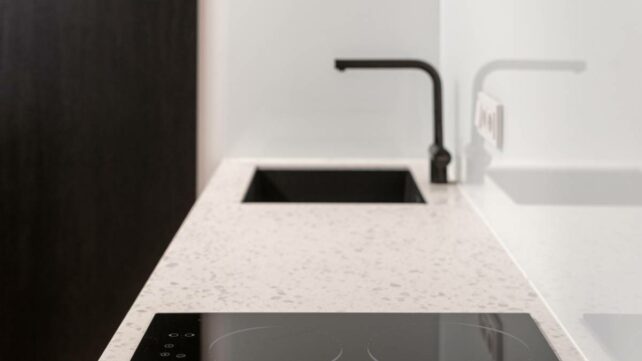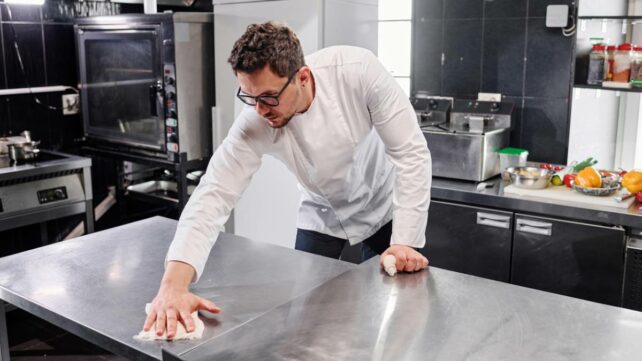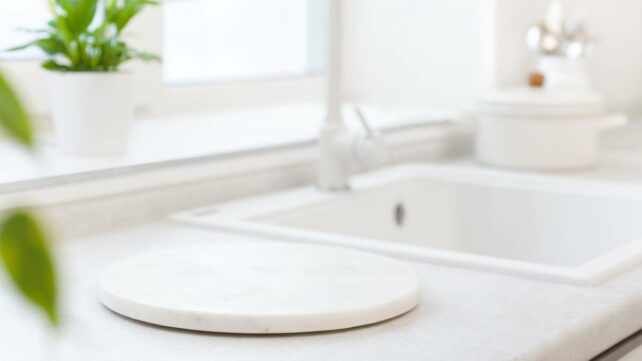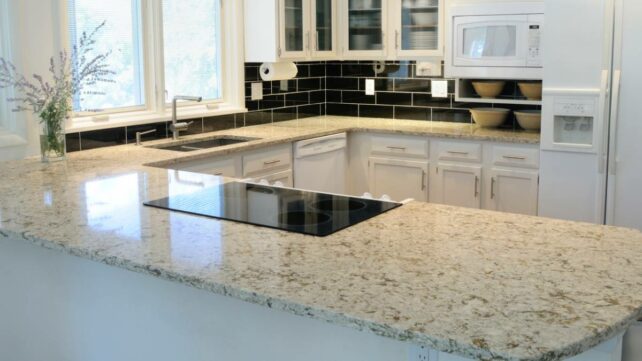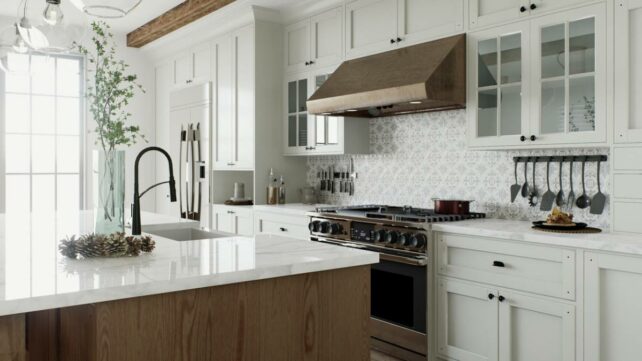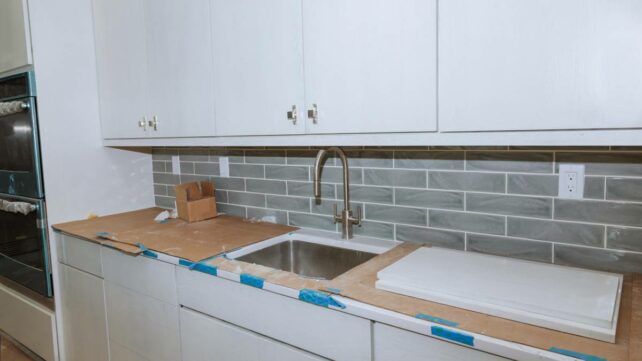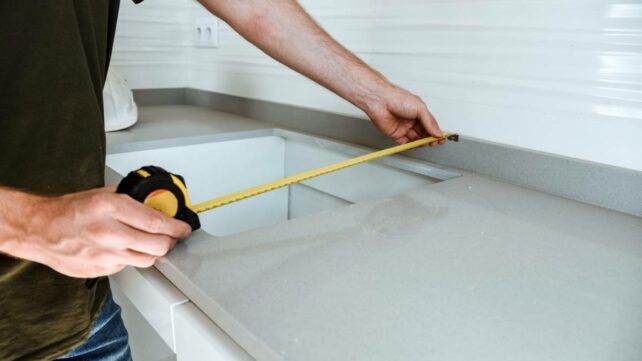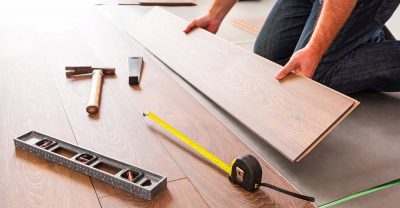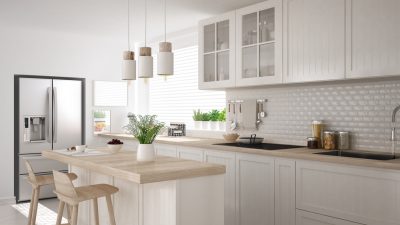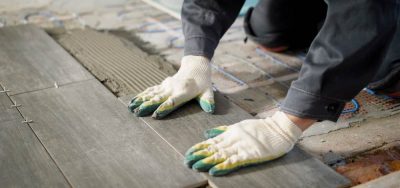- Oneflare /
- Cost Guides /
- Benchtop

How much does a kitchen benchtop cost?
$200 - $2,000 per m2
What's on this page
- How much does a kitchen benchtop cost?
- Kitchen benchtop cost per location
- Price estimates for different benchtop materials
- Factors affecting kitchen benchtop costs
- Tips for choosing the right benchtop material
- Additional considerations on installing benchtops
- Hiring a kitchen benchtop installer
- FAQs on kitchen benchtops
Read Related Benchtop Articles
How much does a kitchen benchtop cost?
Choosing the right benchtop material and design for your kitchen is important for the space’s aesthetic, functionality and durability. If you’re ever renovating a kitchen, think about investing in your benchtop. A kitchen benchtop installation cost ranges from around $200 for basic laminate varieties to over $2,000 per square metre for premium materials like natural stone or engineered quartz.
If you’re looking to spruce up your kitchen’s benchtop, let this guide help you navigate kitchen benchtop replacement costs and the options available, ensuring you make a choice that aligns with your preferences and practical needs.
How much does a kitchen benchtop cost per location?
| City | Average benchtop cost per square metre |
| Melbourne | $800–$2,200 |
| Perth | $550–$1,600 |
| Darwin | $700–$2,500 |
| Hobart | $650–$2,000 |
Depending on where you live, kitchen benchtop resurfacing costs can vary based on the benchtop’s size, material, and labour costs.
For instance, metropolitan cities like Melbourne have a higher starting average price than other state capitals, as reflected in the higher cost of living and the competitive home renovations and construction market. The demand for high-end materials and finishes in these urban areas also contributes to the higher average cost.
In contrast, smaller cities or regional areas might offer lower labour costs due to a lower cost of living, but the cost of materials could be higher due to transportation and availability issues.
How much does a benchtop replacement cost?
The average cost to replace a kitchen benchtop in Australia varies, but prices tend to range somewhere between $1,000 to $1,800.
Prices are determined by location, labour costs, and the material selected for the replacement. A small kitchen might cost anywhere from a few thousand dollars for basic laminate to over ten thousand for high-end materials like marble or engineered quartz, including both material and labour costs.
Price estimates for different benchtop materials
| Benchtop type | Average cost per square metre |
| Stone | $500–$1,200 |
| Timber | $500–$1,500 |
| Marble | $800–$2,500 |
| Granite | $700–$2,000 |
| Laminate | $100–$400 |
| Concrete | $1,000–$1,800 |
| Steel | $900–$1,000 |
| Quartz | $600–$1,350 |
| Corian | $1,000–$1,200 |
| Porcelain | $1,300–$1,500 |
| Acrylic | $1,000–$1,200 |
| Solid Surface | $1,000–$1,200 |
| Bamboo | $300–$400 |
Stone
Engineered stone is more affordable than a natural stone benchtop and is often extremely durable. For stone kitchen benchtops cost, homeowners can expect to pay a price between $500 to $1,200 per square metre. The cost of installation also influences the stone benchtop price.
Timber
This material has a variety of stains, colours, and sizes to accommodate various styles and settings. Timber benchtops can be easily customised to fit your space’s look and functional needs, ensuring that whether you’re aiming for a cosy cottage feel or a sleek, contemporary design, there’s a timber option that will complement your kitchen perfectly. Timber benchtop is normally priced at $500 to $1,500 per square metre.
Marble
The elegance and quality of marble is the reason for the higher price point. The natural beauty of the material adds an upscale touch to various types of settings. Marble kitchen benchtops cost an average of $3,500 or $800 to $2,500 per square metre.
Granite
As a natural stone, granite kitchen benchtops have a higher price tag than engineered stone options, but for a good reason. Its durability is unparalleled, and it is capable of withstanding high temperatures, scratches, and stains, making it an ideal material for the demands of a busy kitchen. A granite benchtop is typically priced at $700 to $2,000 per square metre.
Steel
Stainless steel benchtops are hygienic, versatile, and scratch-resistant. They average $900 to $1,000 per square metre and are ideal for food prep areas because they are easy to keep clean.
Quartz
Quartz is a more affordable benchtop material that mimics the beautiful design of natural stones like marble. A quartz benchtop costs an average of $600 to $750 per square metre. Quartz-based surfaces cost up to $1,300 per square metre.
Laminate
Installing a laminate benchtop is a fraction of the cost of stone and has a high level of durability because it doesn’t chip or crack easily. Replacing laminate kitchen benchtop costs between $100 to $400 per square metre.
Concrete
Concrete is favoured for its durability, natural design, and unique appearance that is more industrial. Polished concrete benchtops are available, which mimic granite or marble for an upscale appearance. It costs $1,000 to $1,800 per square metre.
Corian
The average cost of a Corian benchtop, constructed from acrylic resin, ranges from $1,000 to $1,200 per square metre. Many Australians favour the material for its durability and the variety of available colours and textures.
Porcelain
As a natural stone, porcelain adds a luxe touch to kitchens or bathrooms. While porcelain is not a natural stone but a manufactured material, it offers qualities that closely mimic those of various natural stones and is generally heat resistant. This makes porcelain benchtops highly desirable for their aesthetic and functional benefits. The porcelain benchtop cost is $1,300 to $1,500 per square metre.
Acrylic
Acrylic is hard-wearing and can be moulded into various shapes to accommodate the room they’re placed in once installed. Homeowners can expect to pay $1,000 to $1,200 per square metre.
Solid Surface
Solid surfaces are non-porous, which prevents them from staining and allows them to hold up well to use daily. Although many types are available, solid surface benchtop prices cost $1,000 to $1,200 per square metre.
Bamboo
Bamboo is a great option if you’re considering having an eco-friendly kitchen space due to its material and the way it’s sourced. For those looking for an affordable kitchen benchtop price, bamboo is an ideal option because it costs $300 to $400 per square metre.
Factors affecting kitchen benchtop costs
When considering the cost to install a kitchen benchtop, several key factors come into play. Understanding each of these can help you navigate through your options more effectively and make a choice that suits your budget, style, and functional needs.
Material selection
The choice of material is one of the bigger factors that can affect the price tag of your benchtop makeover. Some materials, like laminate, offer a cost-effective option with various colours and patterns. Others, like quartz, natural stone, and stainless steel, can be more expensive due to their inherent resilience and durability.
In Melbourne, the average cost for kitchen benchtops can range from $800 to $2,200 per square metre, indicative of the city’s appetite for luxury materials like engineered quartz and natural stone and the higher labour costs associated with a metropolitan area.
Size and layout considerations
If you’re the owner of a larger kitchen, this will require more material, eventually leading to a significant increase in the total price of your renovation. The size also affects waste material, especially if your benchtop shape requires large cuts from slabs.
Shape
The shape of your existing or desired benchtop will play a role in your total price, as standard rectangular benchtops are generally less expensive to fabricate than those with irregular shapes, curves, or multiple angles.
Custom shapes requiring more precise cutting and fitting will require more labour time and materials, driving up the final cost.
Installation process
The installation process varies, depending on the number of people used and the material that is handled.
Professional kitchen installation is recommended for materials like natural stone, engineered stone, and solid surfaces due to the need for precise cutting and handling. The cost depends on the length of time it takes to install the benchtop. The complexity of the process can also determine the cost.
Labour
In addition to geographical location and the cost of living, the cost of labour widely depends on the material chosen and the job’s complexity. Professional installation is recommended for hard-to-handle materials like natural and engineered stones, which require specialised tools and skills for cutting, lifting, tiling, and fitting.
In cities like Perth, the average cost ranges from $550 to $1,600 per square metre, reflecting slightly lower labour costs and potentially different preferences in materials and design.
Complexity
The complexity of a benchtop installation can include the number of cuts needed to accommodate sinks, faucets, and appliances, as well as any custom designs or features like integrated draining boards.
Complex installations require more time and skill, increasing labour costs. Your kitchen layout, including any islands or peninsulas, can also add to the complexity and, consequently, the price.
Edge profiles and finishes
Simple profiles like square or bevelled edges are generally less expensive, while more elaborate designs like bullnose, ogee, or waterfall edges require more intricate work, resulting in higher costs.
The finish of the benchtop material—polished, honed, or brushed—can also influence both the aesthetic appeal and the price.
Accessories and extras
Additional features, accessories, and services can enhance the functionality and appearance of your benchtop. At the same time, it will add to the project’s overall cost, since each extra piece requires added labour and materials, impacting the final price.
Examples of accessories include integrated cutting boards, hot pads, or compost bins, as well as pop-up electrical sockets or under-mounted sinks, while painting can count as an additional service.
Benchtop resurfacing
For those looking to update their kitchen without the cost of a complete benchtop replacement, resurfacing may be the option for you. The cost for this process average around $2,500 to $6,000. The process involves applying a new surface layer over the existing benchtop, which can dramatically change its look at a lower cost than installing a new benchtop.
Although friendly for your wallets, resurfacing may not be compatible with all materials and may have its limitations depending on your existing benchtop’s condition and material.
Tips for choosing the right benchtop material
Assess your lifestyle
If you cook often and use heavy pots and pans, you’ll need a durable material like granite or engineered stone that can withstand heat and is resistant to scratches and dents.
Conversely, if your kitchen is more of a social hub or you prefer low maintenance, materials like laminate or solid surfaces could be more suitable, offering easy cleaning and a wide range of design options.
Budget properly
Benchtop materials can vary significantly in cost, from affordable options like laminate to luxury choices like natural stone. Determine your budget early in the planning process, but remember to consider long-term durability and maintenance costs.
Sample the material
Before making a final decision, try to sample as many of the benchtop materials as possible to see which fits your preferences best. Place them in your kitchen to see how they look under the lighting and against the cabinetry at different times of the day. This can help you visualise the overall effect and ensure the material matches your kitchen’s colour scheme and lighting conditions.
Match material with your home’s existing aesthetic
Choose benchtop materials and other add-ons, like tiles, that complement your home’s aesthetic or style. For example, natural wood or stone benchtops can enhance traditional themed kitchens or a rustic kitchen, while stainless steel or polished concrete benchtop might suit a modern or industrial style better.
Understand maintenance requirements
Regardless of the material you choose, each comes with its own care and maintenance requirements. Natural stones like marble and granite require regular sealing to prevent staining, while stainless steel can show fingerprints and scratches more easily. Consider laminate or quartz if you prefer a low-maintenance option since these do not require sealing and are easier to clean.
Additional considerations on installing benchtops
Aircoat Australia
Aircoat is a spray-on coating that creates a transparent air barrier. Reviews for Aircoat Australia are generally positive, with customers reporting improved energy efficiency and air quality in their buildings.
Caesarstone Finish
Caesarstone is a popular brand of engineered stone used for countertops, vanities, and other surfaces. Reviews of Caesarstone products are generally positive, with customers praising their durability, versatility, and low maintenance.
Recommended benchtop height
When installing or renovating benchtops in your kitchen, it’s important to consider their height. A general rule of thumb is to mount them at a height that aligns with your eye level when standing at the bench. This can help prevent strain on your neck and shoulders while using electrical appliances.
How to hire a benchtop installer
Check licences and qualifications
Do your homework and start by verifying that the installer has the licences and qualifications to perform the work in your home. In Australia, for example, anyone carrying out home renovations or installations involving plumbing, electrical, or structural work must be properly licensed.
Although specific licensing requirements for benchtop installers can vary by state or territory, choosing a contractor with a relevant trade qualification confirms they have the necessary training to handle your project competently.
Look for their experience and specialisation
Experience matters, especially with complex materials like natural stone, engineered stone, or solid surfaces that require precise cutting and installation techniques.
Look for a contractor with a proven track record of working with your chosen material. Ask for a portfolio of their work or past clients’ references to check their workmanship.
Get multiple cost estimates
Before you commit to an installer, getting detailed installation costs from several candidates is a good idea. These estimates should break down the costs for materials, labour, and any additional services. Comparing estimates can also help you better understand the market rate and budget more accurately.
Carefully review contracts and warranties
Get a written contract outlining the project’s scope, the materials to be used, the total cost, and the payment schedule. The contract should also include information about the warranty on the materials and the installation work. A warranty can provide peace of mind, but it’s important to understand what it covers and any applicable conditions or limitations.
Discuss project timeline
After narrowing down your options, discuss your project in detail with the potential installers. This conversation should cover everything from the timeline and the steps involved in the installation process to how they handle unexpected issues that may arise. Understanding their approach to your project will help you gauge their professionalism and suitability for your job.
Sealing the deal
For most people, updating your kitchen benchtop is an excellent way to refresh your kitchen space. Understanding the costs of the right design and kitchen benchtop materials, as well as the expert help needed, can ensure the kitchen renovations are done efficiently and hassle-free.
Don’t hesitate to seek kitchen installers to help you build your dream kitchen. Professional guidance can help you throughout the process. With the right planning and professional support, transform your kitchen into a space you and your family will enjoy for many years.
* The cost data is based on Oneflare and third-party sources
FAQs on kitchen benchtops
Does Bunnings install kitchen benchtops?
Bunnings Warehouse offers a range of home improvement services, including kitchen installations. As part of their broader kitchen installation and renovation services, they can assist customers with installing kitchen benchtops.
How long does it take to install a kitchen benchtop?
The time it takes to install a kitchen benchtop can vary widely depending on several factors, including the material of the benchtop, the size and layout of your kitchen, the complexity of the installation, and whether you’re doing it yourself or hiring professionals.
A straightforward, professional installation might be completed in as little as one to two days after the benchtop arrives from the fabricator. However, including measurement, fabrication, and the potential removal of an old benchtop, the entire process from start to finish can span several weeks.
Can you replace the laminate on benchtops?
Yes, you can replace the laminate on benchtops. Over time, however, they can wear out, chip, or simply go out of style, prompting the need for a refresh. Replacing the laminate is a cost-effective way to give your kitchen a new look without the expense of installing an entirely new benchtop.
